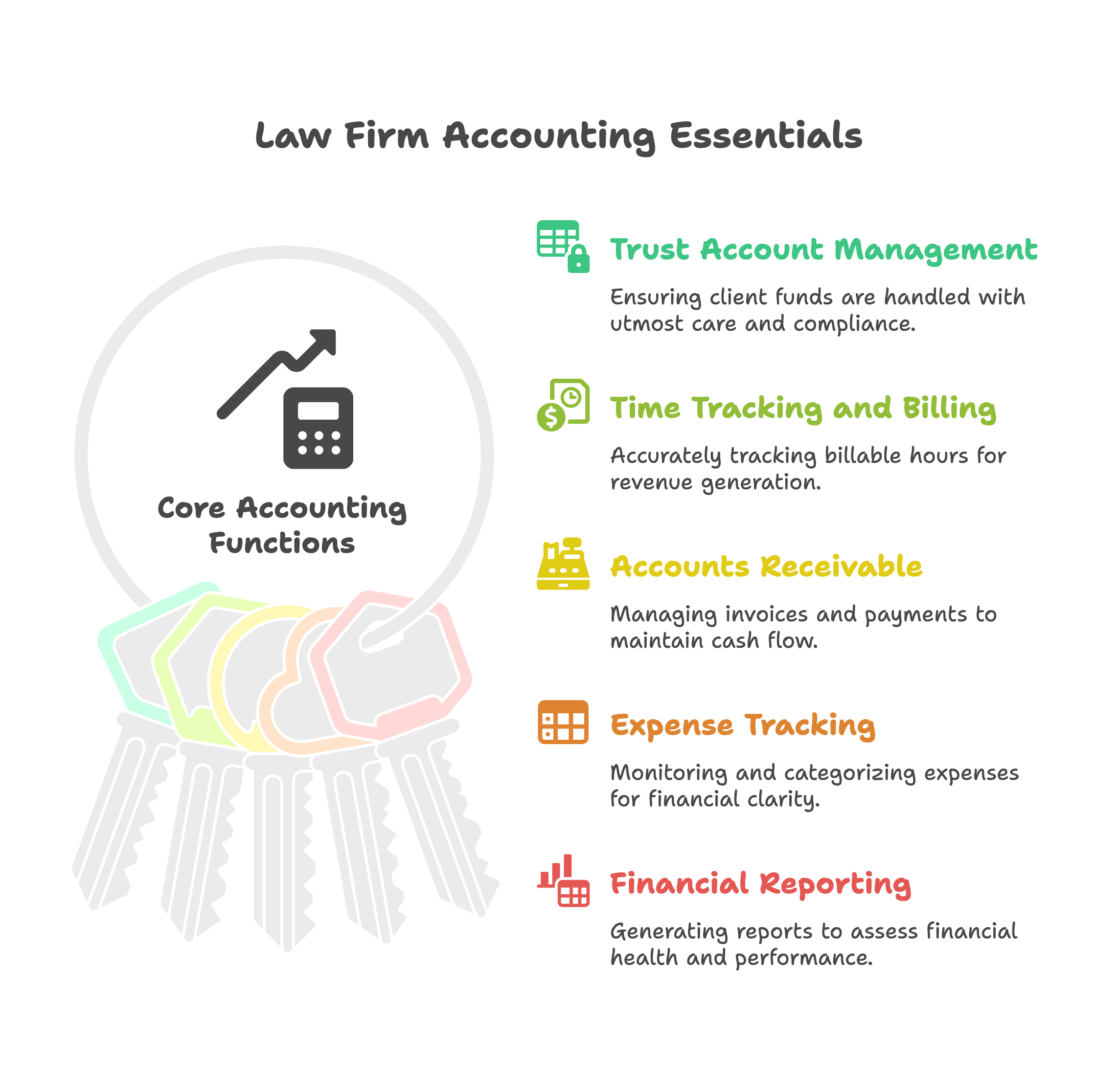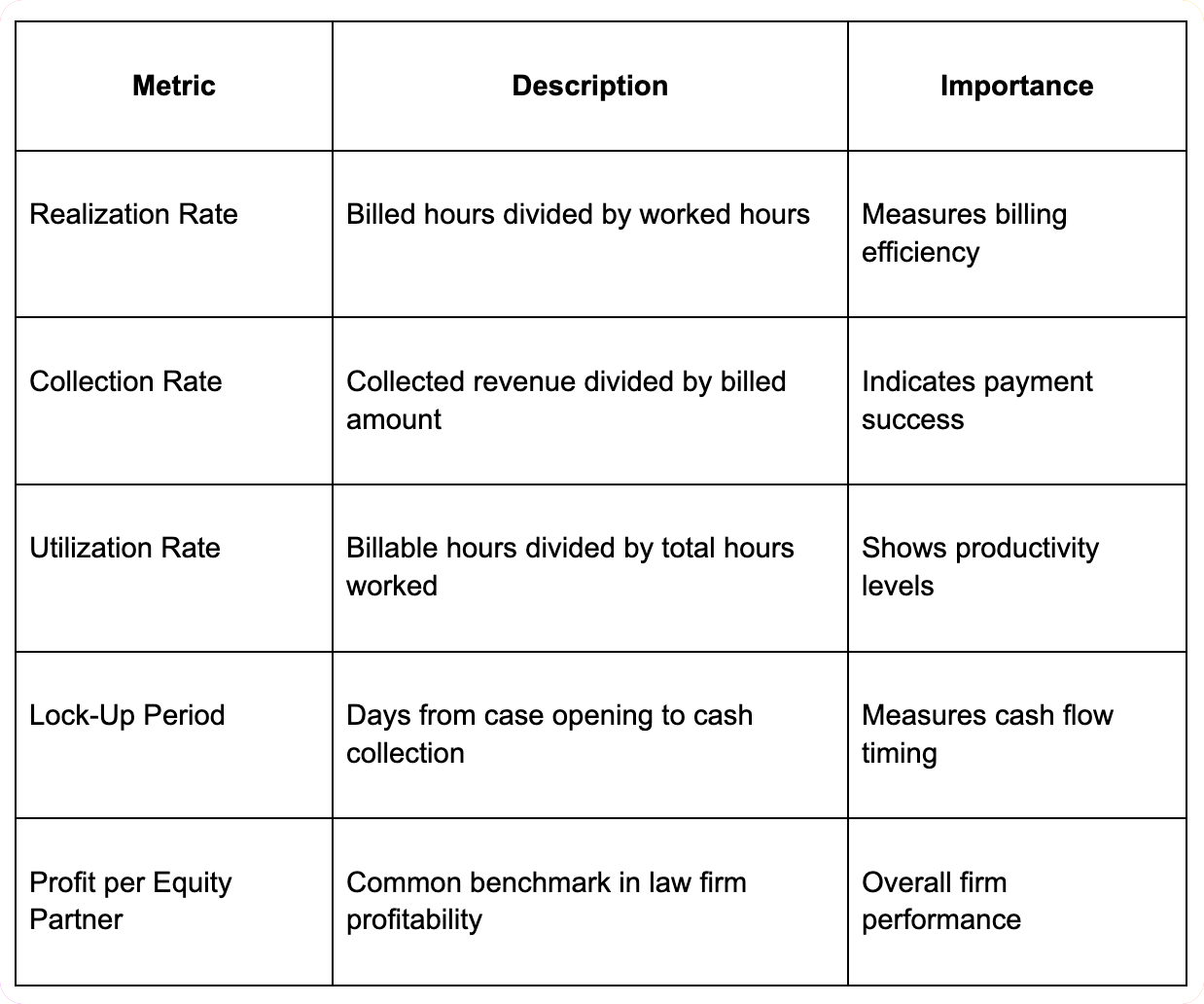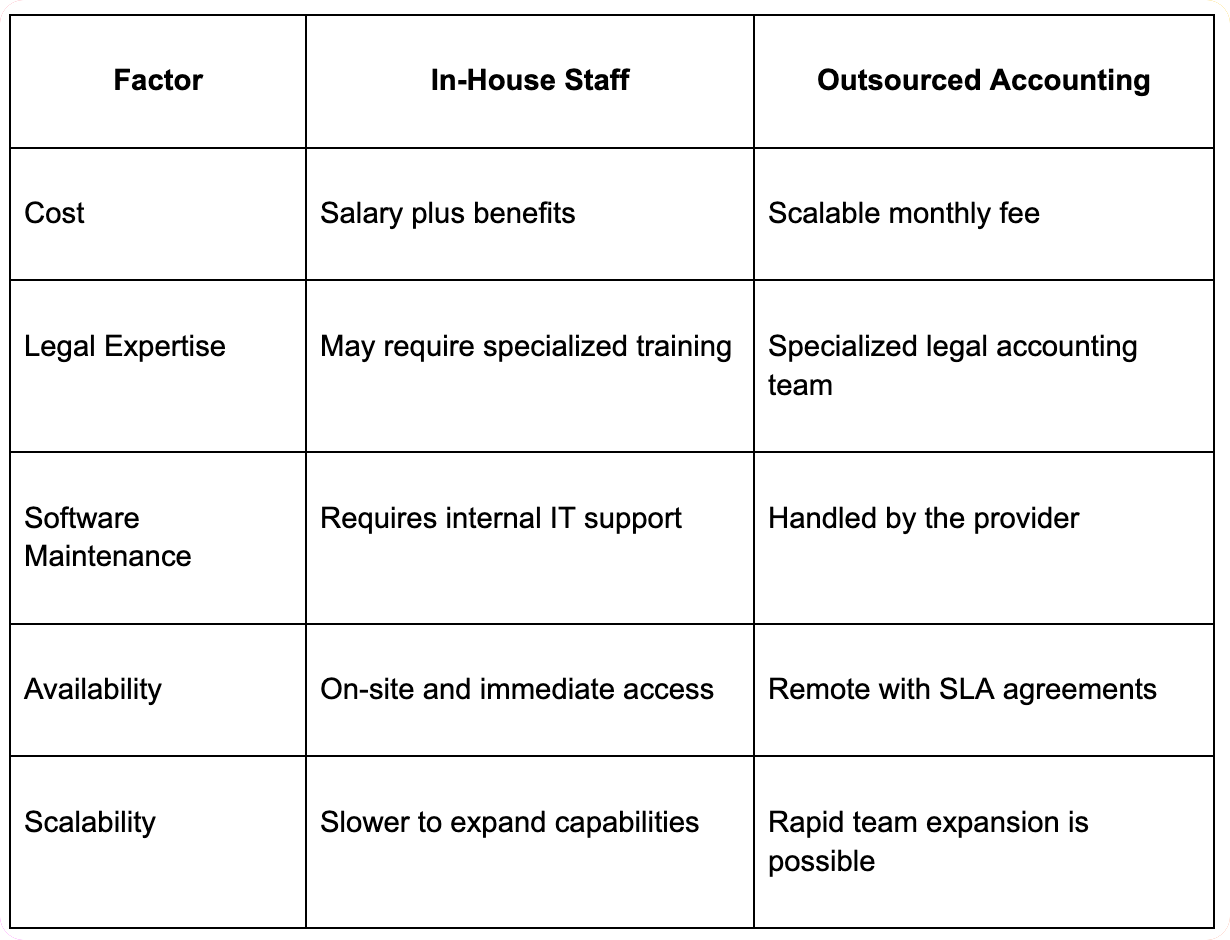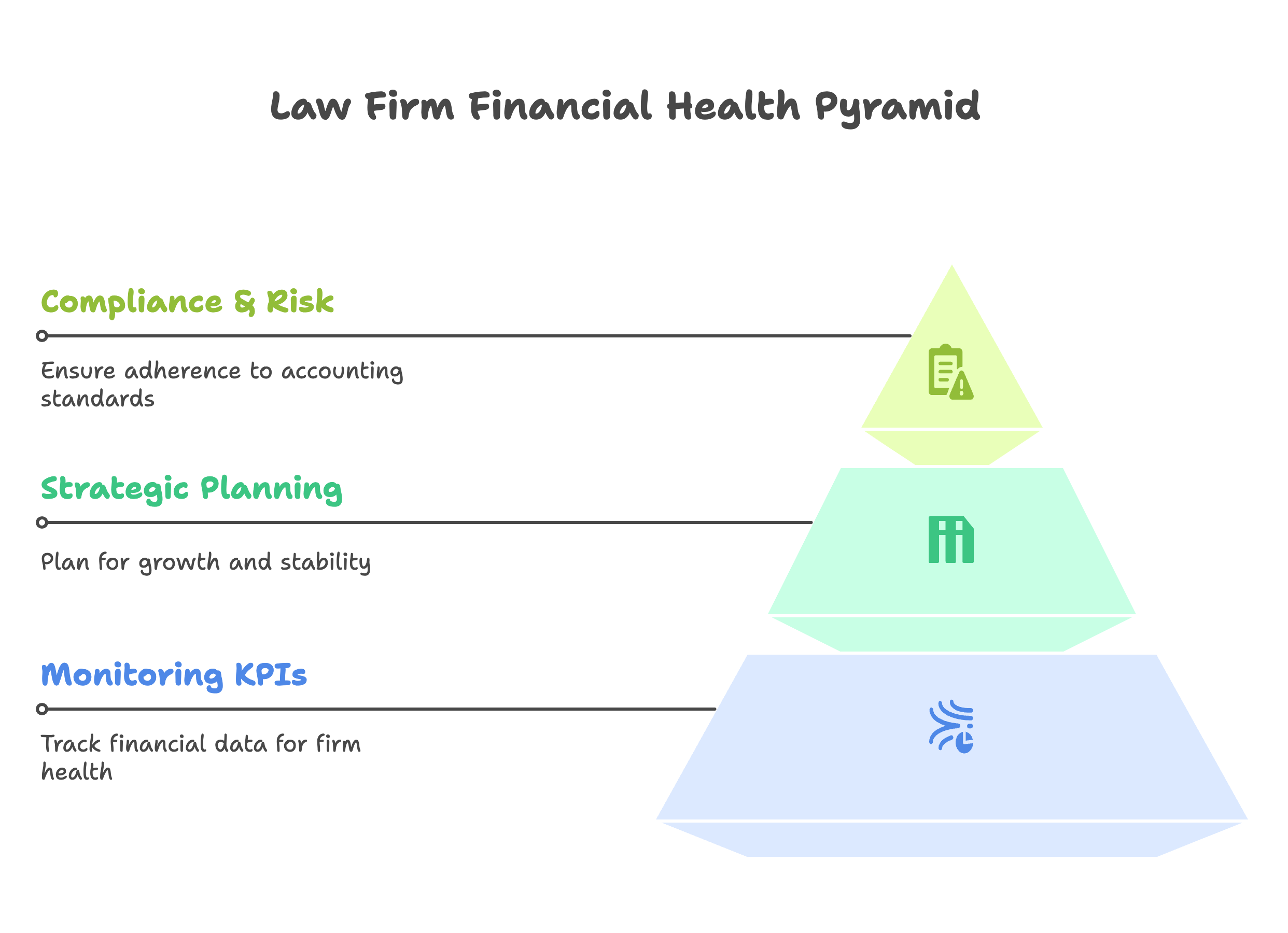Law firm accounting is unlike traditional business bookkeeping. While every company must track revenue and expenses, law firms face added complexity from client trust account management, time tracking, retainers, contingency fees, court costs, and strict ethical guidelines. One small error in the accounting process can lead to compliance issues, lost clients, or even disbarment.
Unlike other professional services, law firms are fiduciaries. This makes it essential for legal practice management to maintain transparency, avoid co-mingling of funds, and generate accurate financial statements that meet bar association standards. Effective financial management is crucial for maintaining the financial health of any legal practice.
Modern law firms increasingly rely on specialized accounting software to manage their complex financial data and ensure compliance with accounting rules. The right law firm accounting software can help law firms streamline their accounting and bookkeeping processes while maintaining the highest standards of ethical compliance.
This guide outlines the best practices for law firm accounting, explains key regulatory requirements, and offers an overview of the top software solutions that simplify compliance, billing, and profitability management for law firms of all sizes.
Law firms operate under ethical and legal responsibilities that exceed normal accounting requirements. Here's why specialized law firm accounting practices are non-negotiable for any legal office:
Trust accounts (also called IOLTA accounts) are used to hold client funds separate from law firms' operational funds. Any mismanagement of trust account funds, such as overdrafts, commingling, or missing documentation, can result in disciplinary action. Proper trust account management is fundamental to law firm accounting compliance.
Legal billing includes hourly rates, flat fees, retainers, and contingency-based arrangements. Each accounting method requires different tracking procedures and reconciliation processes. Law firms need accounting software that can handle these varied billing structures seamlessly.
State bar associations often audit law firms for compliance with accounting standards, including the handling of client funds, disbursements, and proper documentation of financial transactions. An experienced accountant familiar with legal industry requirements is essential for maintaining compliance.
Some law firms use cash basis accounting for simplicity, while others prefer accrual accounting methods to match revenue with work performed. Choosing the right accounting method affects financial reporting, tax filing, and profit measurement. The firm may need guidance from a qualified accountant to determine the best approach.
Law firms must maintain individual ledgers for each client whose funds are held in trust account. Key activities include:
Proper trust account management is perhaps the most critical aspect of law firm accounting, as violations can result in severe professional consequences.
Since billable hours are the primary revenue driver for most law firms, all time entries must be:
Effective accounting software should integrate billing with time tracking to ensure accuracy and prevent revenue leakage that can impact the financial health of law firms.
Law firms must issue invoices promptly, with systematic follow-ups on overdue payments. This accounting process includes:
Law firms incur both internal operating expenses and case-related costs. These financial transactions may include:
Case-specific expenses should be tracked separately in the accounting system for proper reimbursement or contingency arrangements.
Monthly financial reporting should include:

Implementing proven best practices is essential for effective law firm accounting and maintaining compliance with professional standards.
Never combine client funds with law firms' operating funds. Each client must have a separate sub-ledger showing trust account balances and activity. Reconcile these accounts every month to ensure accurate financial data and compliance with accounting rules.
General-purpose accounting software may not be sufficient for law firms. Use platforms that are IOLTA compliant and tailored for legal workflows. The right law firm accounting software should include trust account management, time tracking, and legal billing capabilities.
Keep a clear paper trail for all financial transactions. This includes:
Proper documentation supports both internal financial management and external audit requirements.
Always perform three-way reconciliations: the total of individual client ledgers must match the trust account liability balance, which must match the bank statement. This process is fundamental to proper trust account management and law firm accounting compliance.
Law firms should monitor these critical financial health indicators:

Automated systems reduce delays and errors in the accounting process. Schedule recurring invoices, set reminders for unpaid bills, and offer clients secure payment options through integrated practice management systems.
Segregate accounting duties between timekeeping, billing, collections, and trust account management. This reduces the risk of fraud or misappropriation and strengthens the overall accounting and bookkeeping framework.
Law firms working on contingency must track case costs as advances, not expenses. Once a case is settled, these costs are reimbursed before calculating net revenue. This requires specialized tracking within the accounting system to maintain accurate financial data.
Equity partners may take draws from profits instead of fixed salaries. Law firm accounting systems must reflect equity allocations, capital accounts, and partner distributions accurately for tax and financial reporting purposes.
Many state bar associations conduct random or annual audits of law firms. Firms must be able to produce complete trust account ledgers and reconciliations on demand. Proper legal bookkeeping practices ensure audit readiness.
WIP represents unbilled time and disbursements. Proper WIP tracking in law firm accounting ensures:
Choosing the right accounting software is crucial for law firms seeking to improve their financial management and operational efficiency.

Outsourced accounting solutions are often preferred by small and mid-sized law firms looking for cost-effective access to specialized expertise in legal bookkeeping and financial management.
Legal practices must ensure compliance with various tax obligations. A qualified accountant can help law firms with:
As law firms expand or bring in new partners, financial models help forecast:
CPA firms assist law firms with capital account management, valuation, and structuring of partner buy-ins and buyouts. This specialized accounting work requires understanding of law firm economics and partnership structures.
Regular review and strengthening of accounting workflows help law firms reduce fraud risk and improve the accuracy of financial reporting. This helps maintain the financial health of the practice.
Modern law firms increasingly adopt cloud-based accounting solutions that offer:
Effective practice management requires integration between various systems:
Law firms handle sensitive client information, making data security paramount when selecting accounting software. Key considerations include:
Avoiding these common pitfalls can help your firm maintain compliance and improve financial performance:
Avoiding these mistakes requires a combination of the right law firm accounting software, qualified accountant oversight, and well-trained staff who understand legal industry requirements.
Law firms should regularly monitor financial data to assess their financial health:
Effective financial management for law firms involves:
Maintaining compliance with accounting rules and professional standards requires:

The accounting process for law firms is evolving with new technologies:
Future legal software solutions will offer:
Before selecting law firm accounting software, consider:
Successful adoption of new accounting software requires:
Law firm accounting is a specialized domain that demands attention to legal ethics, client trust obligations, and performance metrics. Mistakes in the accounting process are not just financial—they can lead to serious regulatory consequences and reputational damage that affects the long-term financial health of law firms.
By implementing proven best practices, adopting the right law firm accounting software, and working with qualified accountant partners who understand legal industry standards, law firms can maintain compliance while improving their bottom line. The right accounting solution will help your firm manage trust accounts effectively, streamline financial reporting, and provide the accurate financial data needed for strategic decision-making.
Modern law firm accounting software and proper financial management practices enable law firms to spend less time on administrative tasks and more time focused on practicing law and serving clients. Whether implementing legal accounting software for the first time or upgrading existing systems, law firms should prioritize solutions that offer comprehensive trust account management, integrated billing capabilities, and robust financial reporting features.
With proper accounting systems in place, attorneys can focus on winning cases and building their practice while maintaining the highest standards of financial compliance and professional ethics. The investment in quality law firm accounting software and professional accounting support pays dividends through improved efficiency, reduced compliance risk, and enhanced financial performance.
Question: What are the unique accounting requirements and challenges specific to law firms?
Answer: Law firms face unique accounting requirements including client trust account management, case-based expense tracking, contingency fee arrangements, and billable hour recording. Trust accounting requires strict segregation of client funds, detailed transaction records, and regular reconciliation procedures to maintain compliance with bar regulations. Law firms must track expenses by client and matter, manage advance payments and retainers, and handle complex billing arrangements including contingency fees, hourly rates, and flat fee structures. Additional challenges include managing partner draws, profit distribution calculations, and compliance with legal industry regulations while maintaining detailed audit trails for professional liability protection.
Question: What are the best trust accounting practices law firms should implement?
Answer: Best trust accounting practices include maintaining separate trust accounts for client funds, performing daily reconciliations, implementing three-way reconciliation procedures, and maintaining detailed transaction records. Never commingle client funds with operating accounts, ensure adequate documentation for all transactions, and implement approval procedures for trust account transactions. Maintain subsidiary ledgers for each client, perform monthly reconciliations with bank statements, and conduct regular trust account audits. Use trust accounting software with built-in safeguards, implement segregation of duties, and maintain detailed records for regulatory compliance. Regular training and written procedures help ensure consistent compliance with bar association requirements.
Question: What are the top accounting software solutions designed specifically for law firms?
Answer: Leading law firm accounting software includes Clio for integrated practice management, QuickBooks with legal-specific features, PCLaw for comprehensive legal accounting, and TimeSolv for time tracking and billing. Specialized solutions include CosmoLex for cloud-based legal accounting, LawPay for payment processing, and IOLTA Wizard for trust accounting compliance. Larger firms often use Elite 3E or Aderant for enterprise-level functionality. Choose based on firm size, practice areas, integration needs, and compliance requirements. Key features include trust accounting capabilities, time tracking, billing automation, case management integration, and regulatory compliance tools. Cloud-based solutions offer accessibility and security advantages for modern law practices.
Question: How should law firms handle billable hour tracking and client billing processes?
Answer: Law firms should implement systematic time tracking procedures, automated billing processes, and detailed expense allocation systems for accurate client billing. Use time tracking software with mobile capabilities, establish minimum time increments, and require detailed descriptions for all time entries. Implement approval procedures for billable time, automate invoice generation, and provide detailed billing statements showing time, expenses, and fee arrangements. Track realization rates by attorney and matter type, monitor collection percentages, and implement efficient payment processing systems. Regular training on time entry procedures, billing requirements, and client communication helps optimize revenue capture and collection processes.
Question: What financial reporting and analysis tools are most valuable for law firm management?
Answer: Valuable law firm financial reports include realization analysis by attorney and practice area, cash flow reporting, accounts receivable aging, and profitability analysis by matter type. Key performance indicators include billable hour utilization, collection rates, average billing rates, and profit per partner metrics. Management reports should cover expense analysis, overhead allocation, and comparative analysis across time periods. Specialized reports include trust account reconciliation, work-in-progress analysis, and budget variance reporting. Real-time dashboard reporting helps partners monitor performance, identify trends, and make informed decisions about resource allocation, pricing strategies, and business development activities.
Question: How should law firms manage partner compensation and profit distribution?
Answer: Law firm partner compensation requires systematic tracking of billable hours, business development credits, administrative contributions, and profit allocation formulas. Implement transparent compensation systems, document calculation methods, and maintain detailed records supporting distribution decisions. Consider various models including equal sharing, eat-what-you-kill, modified lockstep, or hybrid approaches based on firm culture and objectives. Track individual partner contributions, monitor firm profitability, and establish clear criteria for compensation adjustments. Regular partner meetings, performance reviews, and strategic planning sessions help align compensation with firm goals while maintaining partner satisfaction and retention.
Question: What compliance and regulatory considerations affect law firm accounting?
Answer: Law firm accounting compliance includes bar association trust account regulations, IOLTA requirements, client confidentiality protections, and professional liability considerations. Maintain compliance with state bar trust accounting rules, implement required record-keeping procedures, and ensure proper client fund segregation. Consider AML (Anti-Money Laundering) requirements, tax compliance for partnerships or professional corporations, and employee benefit plan administration. Professional liability insurance, malpractice prevention procedures, and client communication requirements also affect accounting operations. Regular compliance training, procedure documentation, and professional consultation help ensure adherence to complex regulatory requirements while protecting the firm and clients.
Question: How can law firms optimize their accounts receivable and collection processes?
Answer: Optimize law firm collections through clear fee agreements, regular billing cycles, prompt invoice delivery, and systematic follow-up procedures. Implement electronic payment options, offer payment plans for appropriate situations, and establish clear collection policies communicated to clients upfront. Monitor aging receivables regularly, implement escalation procedures for overdue accounts, and consider professional collection services for difficult cases. Use technology for automated payment reminders, online payment processing, and detailed accounts receivable reporting. Regular analysis of collection patterns, write-off trends, and client payment behavior helps identify improvement opportunities and optimize cash flow management for sustainable law firm operations.

A practical comparison of hiring a freelancer vs using a dedicated offshore accounting team, focusing on continuity, quality control, security, and scaling.

How CPA firms outsource payroll and 1099 work to reduce penalties and admin load, with a clean workflow for approvals, filings, and year-end reporting.

Practical do's and don'ts for CPA firms outsourcing accounting work, based on common failure points and what successful rollouts do differently.